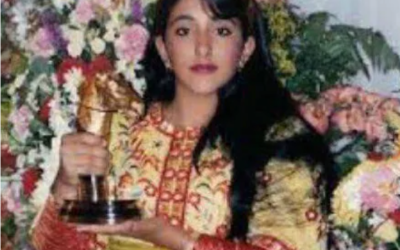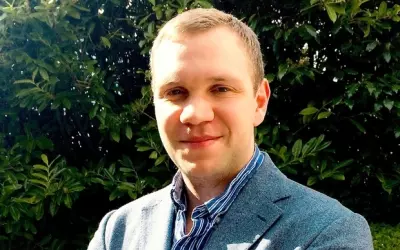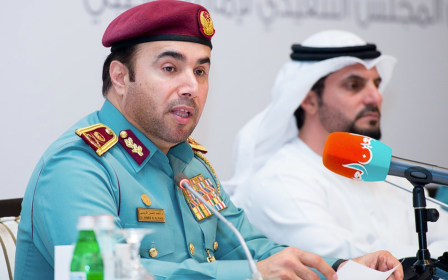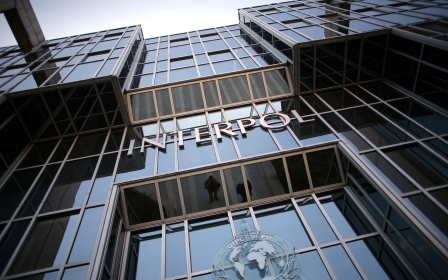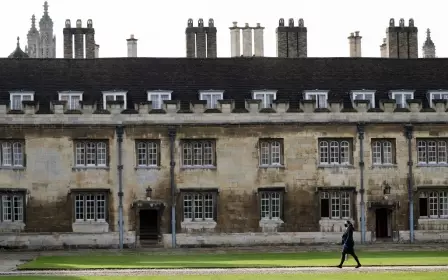British detainees accuse Emirati nominee for Interpol chief of overseeing torture

Two British citizens who say they were arbitrarily detained and tortured in Emirati custody have filed a lawsuit against United Arab Emirates’ police chief, Major General Ahmed Naser al-Raisi, in a Turkish court.
Raisi is expected to be elected as Interpol’s new president following a vote in Istanbul on Thursday. He was elected as the Asia delegate for the international police service in 2018.
'We have evidence that al-Raisi was involved in torture'
- Rodney Dixon QC
“We have evidence that al-Raisi was involved in torture,” Rodney Dixon QC, the plaintiffs' lawyer, said in an Istanbul press conference. “We’re organizing this press meeting at the hotel where he [al-Raisi] is staying.”
“The UAE has done absolutely nothing following investigation requests from the attorney as well as from the UK government. The UAE has ignored all requests,” he added.
Raisi’s nomination for Interpol’s presidency has raised concerns among human rights groups. As a senior police chief in the UAE, he has been accused and implicated in various abuses by the Emirati security forces.
New MEE newsletter: Jerusalem Dispatch
Sign up to get the latest insights and analysis on Israel-Palestine, alongside Turkey Unpacked and other MEE newsletters
Interpol told Middle East Eye Raisi would remain a full-time official in Dubai if successful, noting that it is an unpaid and part-time post separate from the force's overall head.
Arbitrary detention, forced confessions alleged
One of the detainees, British academic Matthew Hedges, was held by UAE police while conducting research in May 2018. He was accused of spying for the UK, a close Emirati ally.
Then aged 31, Hedges claims he was held in a cell, beaten, tortured, abused verbally, given tranquilisers and eventually forced to sign a false confession.
“I still don’t know what offences were charged on me,” he told journalists.
As a result, Hedges was given a life sentence, but was handed a presidential pardon following pressure from the UK government.
“He [Raisi] has allowed all these things to happen to me. It’s impossible that he was not aware of what was going on,” he said.
Hedges called on Interpol's member states to cast their votes elsewhere.
“The countries that are eligible to vote should refuse [this candidacy], and show the world that Interpol takes crime allegations seriously," he said, adding that Raisi’s presidency would be “a reward for his doings in his own country”.
'Beaten and thrown into street'
The other plaintiff, Ali Issa Ahmad, was detained by UAE security forces while watching a football game as he holidayed in the country. Ahmad was wearing a Qatari shirt when he was arrested, at a time when the UAE was blockading its Gulf neighbour.
“It was 2018 when the World Cup was being played. As a staunch soccer fan, I was watching a game when I realised that I was under physical surveillance. It was the UAE police that followed me to the hotel where I was staying and detained me without providing any reason or information,” he said.
'They took me to a hospital for treatment but later brought me back to the detention centre, continuing torture'
- Ali Issa Ahmad
Ahmad said he was taken to an unknown location and given no right to make a phone call. He said a police officer asked him angrily why he was wearing a T-shirt with the Qatari flag. Then, the policeman attempted to cut the flag out of the T-shirt, cutting Ahmad as well, the Briton claimed.
“They took me to a hospital for treatment but later brought me back to the detention centre, continuing torture,” he said.
After his relocation to an official police centre, he managed to call one of his friends in London to inform the British embassy. Following pressure from the embassy, “they [the police] literally threw me into the street but held all my belongings, including [my] passport”.
Ahmad pointed to Emirati funding for Interpol, claiming that it was an attempt to secure Raisi's presidency and give its own forces cover.
In 2017, the UAE pledged $56m to Interpol, approximately a third of the force's annual budget. Several human rights groups accused the UAE of trying to buy influence.
Middle East Eye has asked the UAE foreign ministry for comment.
Not much hope
One of the lawyers filing the complaint, Tugce Duygu Koksal, said they were able to pursue the lawsuit in Turkey despite the parties being foreign and the alleged crimes committed abroad because it concerned "a crime against humanity".
“Now, Turkey can apply universal jurisdiction according to its criminal law,” she said.
This is not the first lawsuit levelled against Raisi ahead of the Interpol vote.
Dixon filed a complaint in Paris last month, and two weeks ago Turkish lawyer and human rights activist Gulden Sonmez launched his own action on the grounds that Raisi was “accused of enforced disappearance, arbitrary detention, torture and sexual assault, committed under his responsibility and sometimes with his own participation”.
However, Koksal believes that election of Interpol’s president is a political decision, largely dependant on international relations. “Currently, we are doing what we can do under the legal framework.”
British newspaper the Daily Mail reported last month that four former UK ministers were part of a “secret plot” to back Raisi’s nomination.
According to Koksal, the lawyers representing Hedges and Ahmad have had no contact from Turkish government officials.
Middle East Eye delivers independent and unrivalled coverage and analysis of the Middle East, North Africa and beyond. To learn more about republishing this content and the associated fees, please fill out this form. More about MEE can be found here.


